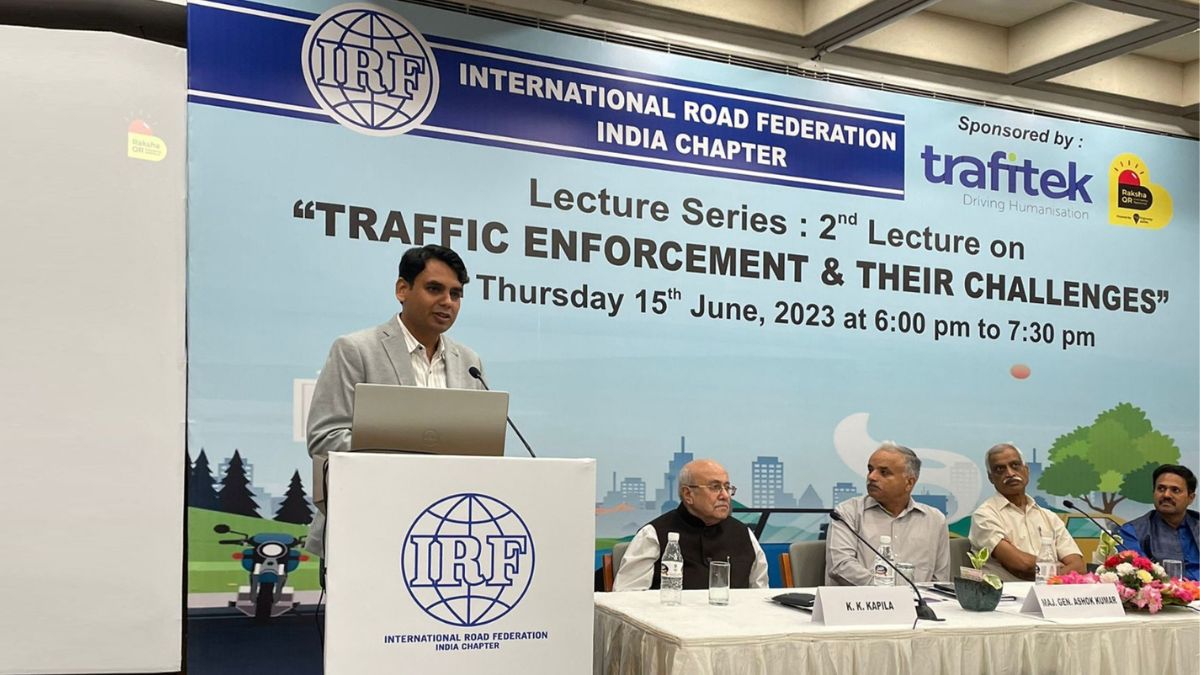Raksha QR: Innovative Tool for Emergency Care
Timely rescue after a vehicle collision is crucial in reducing casualties and damage

Advertisement
New Delhi: As the largest cause of death and injury worldwide, poor road safety should be treated as seriously as a pandemic. According to recent data, between the ages of 15 and 49, car accidents are the leading cause of mortality. About 1.3 million people per year are killed in automobile accidents throughout the world.
India, which has one of the world’s biggest road networks, is first in the number of road accident fatalities among 199 nations and is responsible for over 11 percent of all accidental deaths worldwide. About 1.5 million people are killed each year in traffic accidents in India. This breaks down to roughly 422 fatalities each day, 1130 accidents, and 18 deaths every hour. It’s a major problem that has important societal and economic repercussions for the United States.
Education, Engineering (of roads and cars), Enforcement, and Emergency Care are the four pillars of a comprehensive road safety policy that has been adopted by India’s Ministry of Road Transport and Highways (MORTH).
Timely rescue after a vehicle collision is crucial in reducing casualties and damage. The World Health Organisation (WHO) identifies post-accident reaction time as one of the five pillars of enhancing road safety. Emergency medical services (EMS), fire departments, police departments, transportation companies, towing companies, and so on are all involved.
In India, for example, if accident victims get care within the first few hours after a tragedy, half or more of the 1.5 million lives lost annually may be spared. In the absence of an ambulance, this is only feasible if onlookers act as Good Samaritans and notify surrounding hospitals and police of the situation, as well as provide first assistance to the wounded.
Mr. Akhilesh Srivastava, Road Safety Ambassador and leader of this World Economic Forum pilot of Road Safety 2.0, said at the launch of RakshaQR that while it is plausible in theory that Bystanders will act and provide the necessary support, in practise this is not possible unless we help the Bystander with some technological intervention. And that is why Road Safety 2.0 is all about implementing new technological solutions to old problems.
Highway Delite, a new and promising business, came up with this novel approach and has released RakshaQR, an emergency response support product, so that witnesses can simply scan the RakshaQR on the victim’s car and phone the family member to report the accident. Both the informant and the victim’s loved ones’ identities will remain hidden throughout the call since it will be routed via a virtual number. Highway delite records the caller’s position at the time of the accident report and notifies neighbouring medical facilities and law enforcement agencies behind the scenes.
RakshaQR allows drivers to sign up for Highway Delite and provide facts such as their blood type, car insurance, medical insurance, and emergency contact information for family members. In the event of an accident intimation call, only the family emergency contact (by SMS) or the registered vehicle owner (as part of their RakshaQR profile) would have access to this data.
At the opening ceremony, Mr. Kiran Kapila, President Emeritus of the International Road Federation’s India Chapter, said that this is a fantastic initiative to enhance one of the 5Es of Road Safety. He said that the RakshaQR would be a tremendous asset to the Bystanders Training Programme that the IRF(IC) is presently doing.
Mr. Akhilesh Srivastava encouraged the stakeholders to create more technology-enabled solutions to connect the Digital Bystander. He said MoRTH should give limited API-based access to Integrated Road Accident Database (iRAD) System so that this can be used by such innovative Startups to save lives on highways. Highway Delite brought out that in the next phase, they plan to create a complete digital track record of intimation to availability of emergency care response from hospitals/trauma centers/ambulances and also to connect insurance companies.
RakshaQR also helps vehicle owners to get a notification in case of unattended vehicle scenarios including wrong parking, unauthorized parking, and vehicle-related issues (fuel leak, windows open, keys left), wherein the bystander/ traffic police can inform vehicle owners about any of the above scenarios through Call/SMS by scanning RakshaQR with a basic scanner from their mobile phones. Raksha QR system is developed to work in a web environment, and both the Bystander and vehicle owner are not required to download any kind of mobile application. This vehicle notification feature of RakshaQR can be used by all types of vehicles, including 2-Wheelers, 4-Wheelers, and Commercial Vehicles.
Mr. Akhilesh Srivastava concluded that this is just the first phase of RakshaQR, and in the subsequent phases, they should enable much more and bring a connected and digital way of responding with timely medical assistance for accident scenarios through real-time integration with ambulances, hospitals, vehicles OEMs, police stations, NHAI, PWDs, and other motor and transport departments.
About Highway Delite:
Company Profile:
Company Name: Param People Infotech Solutions Pvt Ltd
Trademark Name (Known as): Highway Delite
Date of Incorporation: May 2015
About Highway Delite:
Highway Delite is a digitally connected mobility services platform with over Ten lakhs+ customers using the Highway Delite application. We provide verified highway wayside amenities information and mobility services, including RakshaQR, FASTag, GPS tracking, EV Charging stations, Insurance and RSA, and road safety products, including reflective tapes and other products. We work with over 10,000+ field partners as our service touch points and over 1000+ OEM dealerships and also with tourism departments, Auto OEMs, OMCs, transport departments, and banks as our stakeholder partners.
For more details, please visit our website: https://highwaydelite.com/#/home
Advertisement

